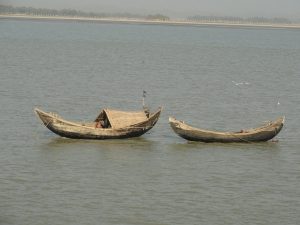A powerful ethnic armed group in western Myanmar says that it is now in full control of the country’s border with Bangladesh, after overcoming the final Myanmar military base in the town of Maungdaw.
The Arakan Army (AA), which is fighting to create an autonomous state for the Rakhine ethnic group in western Myanmar, seized the military stronghold known as Border Guard Post No. 5 near Maungdaw on Sunday, the group said yesterday.
“The Arakan Army successfully captured and neutralized the last remaining outpost… in the Maungdaw region,” it said in a statement quoted by Radio Free Asia.
The statement added that Myanmar army personnel members who were defending the base were trying to flee across the Naf River, which forms the border with Bangladesh, “using motorboats and canoes.” The AA claimed that the regime troops were accompanied by Muslim Rohingya fighters.
“Clashes are still occurring … Therefore, due to military necessities and public security concerns, all river transportation in the Naf River will be indefinitely suspended,” the group said.
Rakhine media reported yesterday that the AA arrested Brig. Gen. Thurein Tun, commander of Military Operation Command 15, along with regime troops including about 80 Rohingya insurgents, according to a report in The Irrawaddy.
While the AA’s claims could not be verified – internet and mobile phone services in the area have been mostly cut off as the battle for Maungdaw has intensified – the group’s capture of the township would complete its control of the northern part of Rakhine State, and mark another important step forward in its bid to establish a self-governing Rakhine polity.
The AA’s recent campaigns have raised fears of a revival of organized violence against members of the Muslim Rohingya minority, who were subject to an ethnic cleansing campaign that expelled more than 740,000 of them across the border into Bangladesh in 2017. (The chief prosecutor at the International Criminal Court recently requested an arrest warrant for junta chief Senior Gen. Min Aung Hlaing in connection with the expulsions.) The group’s capture in May of Buthidaung, a town to the southeast, was followed by allegations of mass arson attacks and the displacement of tens of thousands of civilians, mostly Muslim Rohingyas. Rights organizations also accuse the AA of massacring a group of Rohingya civilians in Maungdaw in August.
The AA has denied the claims that it has launched attacks on Rohingya communities, with varying degrees of plausibility. But it has constantly emphasized that there are large numbers of Rohingya fighters who have joined the Myanmar military. Some of these belong to militant groups like the Arakan Rohingya Salvation Army (ARSA) and other groups; others have reportedly been press-ganged into the ranks by the Myanmar military.
The AA is a member of the Three Brotherhood Alliance, which has seized large territories in northern Shan State since launching Operation 1027 in October of last year. As its allies have overrun junta positions in the northern part of Shan State, including the historic defeat of the military’s Northeast Regional Command in Lashio, the AA has made significant gains in Rakhine State since November 2023.
Having overcome the stubborn resistance in Maungdaw, the AA now appears to exercise primary control over 11 of the state’s 17 townships. It also occupies all three townships bordering Bangladesh, which also include Buthidaung Township in Rakhine State, which it seized in May of last year, and Paletwa Township in neighboring Chin State, which it overran in January.
The AA is also currently fighting for control of three townships – Gwa, Taungup, and Ann – in the southern part of Rakhine State. The Irrawaddy reports that AA troops have seized most of Ann town “along with over 30 junta strongholds and bases” in the township, which is also home to the headquarters of the Myanmar military’s Western Regional Command, which has jurisdiction over Rakhine State, the southern part of neighboring Chin State, and the country’s territorial waters in the Bay of Bengal.
Should this fall, it would be the second of the military’s 14 regional military commands to fall to the resistance coalition, after the humiliating loss of the Northeast Regional Command in Lashio in early August.
With the battles in the north seemingly at an end, the AA will now presumably be able to transfer troops and resources to the southern front. It seems like it is only a matter of time before the Myanmar military’s position in Rakhine State collapses altogether.

































